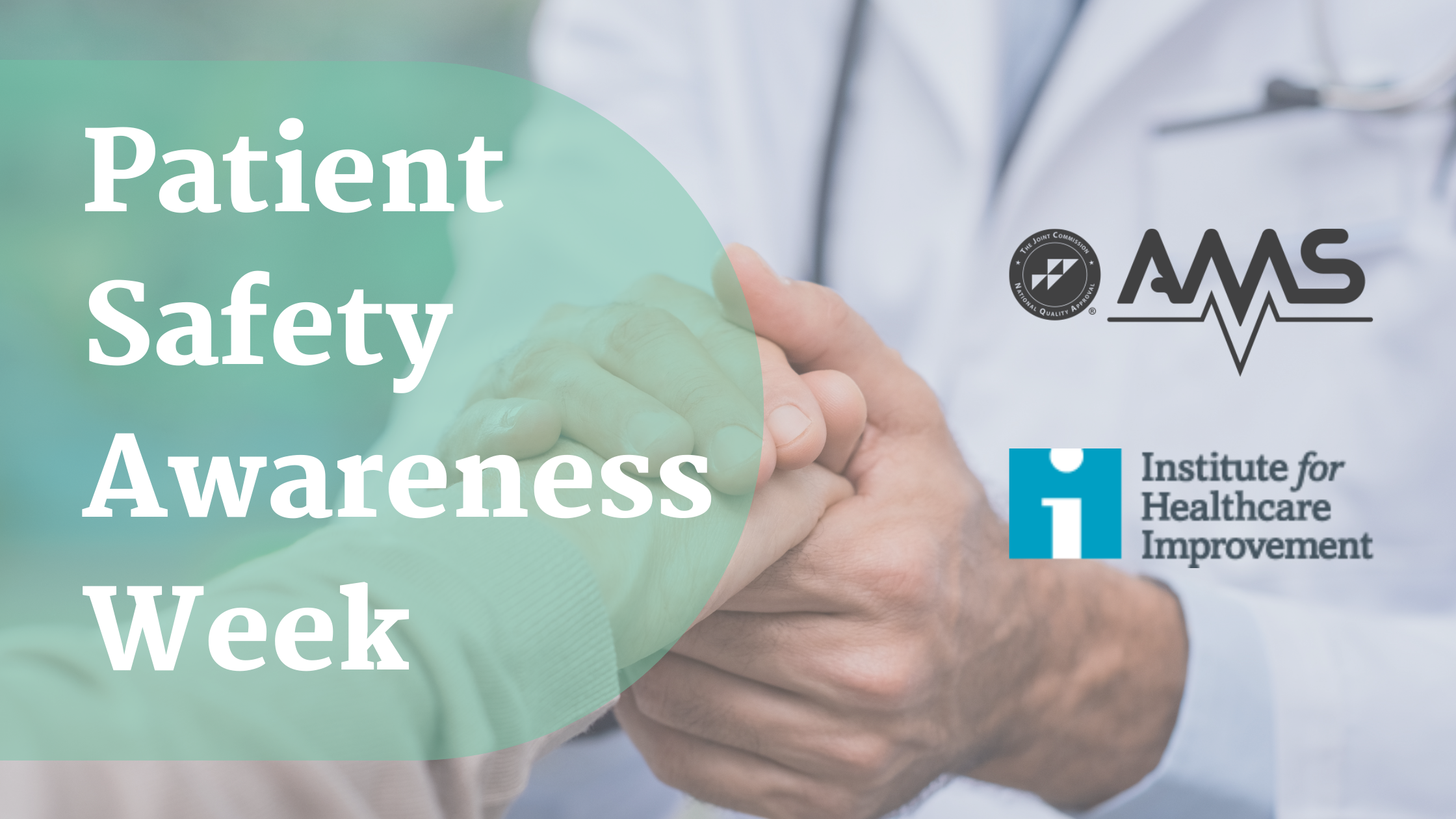Patient Safety Awareness Week 2022

Patient Safety Awareness Week is “intended to encourage everyone to learn more about health care safety. During this week, IHI seeks to advance important discussions locally and globally, and inspire action to improve the safety of the health care system — for patients and the workforce.”
At Advanced Monitoring Services, the safety of our patients is our highest priority. This week is #PatientSafetyAwarenessWeek. We are proud of our commitment to providing safe, exceptional patient care to our patients, rooted in the principles of the The Joint Commission and backed by a world class assurance program.
Quality patient care does not happen by accident. There are strict procedures that each organization, facility, and provider must follow to ensure patients are receiving the safest care. In 2019, AMS received accreditation from The Joint Commission and continues to uphold the rigorous standards set forth in the service of ambulatory healthcare.
Culture of Safety
To ensure our patients receive the highest standard of care, AMS strives to create a Culture of Safety that benefits not only our patients, but our staff as well. Below, is our commitment to a Culture of Safety.
Policies and Protocol
From day one, each surgical neurophysiologist at AMS is equipped with the skills and standards to ensure proper patient safety.
Facility/Operating Room Etiquette – Surgical neurophysiologists are trained and evaluated on their presence in the operating room. This includes everything from clear and effective communication to understanding standard precautions and infection control in the operating room. AMS surgical neurophysiologists understand that they are guests in the OR while also seamlessly integrating into the OR team.
Pre-Operative visit – Visiting the patient in the pre-operative holding area not only allows the technologist to obtain consent to monitor the patient but gives them the opportunity to interview the patient, understanding the patient’s history, symptoms, and ensuring there are no contraindications that could affect quality care. The pre-operative visit also allows the patient to ask questions to better understand the service that will be provided.
Protocol for Neuromonitoring – Each surgical neurophysiologist is intensely trained and tested on procedure and pathology-based protocols to ensure competent, quality neuromonitoring. Thoroughly understanding these protocols is necessary to provide the surgical team with accurate and timely information. AMS surgical neurophysiologists are supported by an interpreting physician who provides oversight and data interpretation throughout the entirety of each procedure.
Quality Assurance Audits with Feedback
Our quality assurance team grades and provides constructive feedback to each surgical neurophysiologist on ways to improve their documentation. The purpose behind our quality assurance initiative is to continuously improve clinical performance. This process is crucial to ensure the highest level of accountability and quality. Our QA scorecards are regularly reviewed and updated to include the latest documentation standards.
Quality and Safety Concerns
AMS encourages reporting of quality and safety concerns so they may be addressed efficiently. These “near misses” as defined by The Joint Commission, or “good catches” at AMS, are an essential component of our continuous improvement process.
Incident Reporting – Incidents are monitored and measured to ensure proper action is taken when work-related incidents occur. AMS strives to create a safe workplace for our staff so they can provide the highest quality patient care. This includes, but is not limited to:
- Workplace Aggression/Violence
- Adverse Events
- Errors
- Near Misses
- Sentinel Events
- Good Catch Program
National Patient Safety Goals
Our number one priority is to keep our patients safe while they are in our care. These goals are constantly promoted and evaluated to ensure each technologist is following the path towards “zero harm.” These goals include, but are not limited to:
- The Principles of Asepsis are maintained
- Hand Hygiene protocol is followed and evaluated regularly
- Safety practices are in place to protect the patient during times of dependence
- Patient timeout is performed with tech involvement
- “Do Not Use List”
- Provided to ensure proper terminology is used in case documentation and communication
- Appropriate and safe equipment is available
- Staff are competent to perform their responsibilities
- Personal security is addressed
- Policies and practices are in place to prevent the spread of disease
- Policies and practices are in place to prevent injury from equipment
- Individual health practices are encouraged
- Ongoing educational programs are provided to instruct personnel on safety habits
- A policy is in place regarding employee incidents, injury, or exposure to a biologic hazard
- Storage of chemicals and toxic or dangerous materials protects personnel
- Medical Records Acknowledgement
- Right to confidentiality and HIPAA requirements are followed
- Product Recall Policy is followed
We pride ourselves in the measures we take to ensure the safety and quality of neuromonitoring care we provide our patients. Without our staff and surgical neurophysiologists, this would not be possible. Advanced Monitoring Services is continually reviewing and updating these policies and procedures so our employees have the most conducive work space to care for patients.
Because if we can better serve our people, we can better serve our patient.
